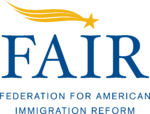Federation for American Immigration Reform facts for kids
 |
|
| Formation | 1979 |
|---|---|
| Founder | John Tanton Otis L. Graham Jr. Sidney Swensrud |
| Founded at | Washington, D.C., U.S. |
| Legal status | Non-profit tax exempt |
| Headquarters | Washington, D.C., U.S. |
|
Region
|
United States |
|
Key people
|
Daniel A. Stein, president (1988-) |
| Affiliations | Immigration Reform Law Institute (IRLI) (est. 1987) FAIR Congressional Task Force (FCTF) (est. 2004) Center for Immigration Studies (CIS) (est. 1985) |
|
Budget
|
Revenue: $11,157,713 Expenses: $11,246,727 (FYE December 2016) |
The Federation for American Immigration Reform (FAIR) is a nonprofit group in the United States that wants to reduce immigration. The organization works to change U.S. immigration laws by publishing reports, holding events, and talking to lawmakers.
FAIR is a controversial group. The Southern Poverty Law Center (SPLC), an organization that tracks extremism, calls FAIR a hate group. The SPLC says FAIR has connections to white supremacist ideas. FAIR denies these claims.
The group was started in 1979 by John Tanton, a doctor from Michigan. Its main office is in Washington, D.C.
Contents
History of FAIR
Founding and Early Goals
FAIR was founded by John Tanton, Professor Otis Graham, and businessman Sydney Swensrud in 1979. Tanton was an eye doctor who was also involved in environmental groups like the Sierra Club. He was worried that a growing population, partly caused by immigration, could harm the environment.
When other groups he was in didn't want to focus on limiting immigration, Tanton decided to start his own. He created FAIR to push for fewer immigrants coming to the U.S., both legally and illegally. He also started other similar groups, like the Center for Immigration Studies and NumbersUSA.
In the 1980s, FAIR became more successful. It raised money through mail campaigns and received donations from foundations like the Laurel Foundation and the Pioneer Fund.
Controversies and Criticisms
FAIR has faced a lot of criticism over the years, much of it related to its founder, John Tanton, and its funding.
The WITAN Memos
In 1986, John Tanton wrote private memos to his colleagues that were later leaked to the public in 1988. In these memos, known as the "WITAN memos," Tanton expressed fears about immigrants from Latin America. He worried that their higher birth rates would change America's culture and politics.
He wrote about a "Latin onslaught" and questioned if Hispanic people could be educated as easily as Asian people. He also wrote that for "European-American society and culture to persist requires a European-American majority." These comments were seen by many as racist and caused a major scandal. Tanton had to resign from another group he started, U.S. English, because of the memos.
FAIR's president, Dan Stein, later said that the organization is not responsible for everything Tanton wrote in his private letters.
Funding from the Pioneer Fund
In the 1980s and early 1990s, FAIR received over a million dollars from the Pioneer Fund. This was controversial because the Pioneer Fund was known for funding research into racial differences, which many people considered to be racist. After this information became public, FAIR said it stopped taking money from the Pioneer Fund.
SPLC Hate Group Label
The Southern Poverty Law Center (SPLC) has labeled FAIR a "hate group." The SPLC points to the views of FAIR's founder, its connection to the Pioneer Fund, and other statements made by its leaders as reasons for this label.
FAIR strongly disagrees with this. The group's president, Dan Stein, has said the SPLC is just "name-calling" and "smearing" people who want immigration laws to be enforced.
Political Activities
FAIR tries to influence immigration laws through lobbying and public campaigns. Lobbying is when a group tries to persuade politicians to vote a certain way.
Support for State Laws
In 1994, FAIR supported Proposition 187 in California. This was a proposed law that would have stopped undocumented immigrants from using public services like schools and non-emergency healthcare. The law passed but was later blocked by the courts.
In 2004, FAIR also helped pass Proposition 200 in Arizona. This law required people to show proof of citizenship to vote or get certain public benefits.
"Hold Their Feet to the Fire" Events
Since 2007, FAIR has hosted an annual event in Washington, D.C., called "Hold Their Feet to the Fire." During this event, dozens of conservative radio hosts broadcast from the city, encouraging their listeners to call Congress and demand stricter immigration laws.
Fighting the 2007 Immigration Bill
In 2007, President George W. Bush supported a major immigration reform bill. This bill would have created a way for many undocumented immigrants to become U.S. citizens. FAIR, along with its partner groups, worked hard to defeat it. They organized call-in campaigns that flooded the phone lines at the U.S. Capitol. Their efforts were successful, and the bill failed to pass.
See also
- Center for Immigration Studies
- NumbersUSA
- You Don't Speak for Me
 | John T. Biggers |
 | Thomas Blackshear |
 | Mark Bradford |
 | Beverly Buchanan |

